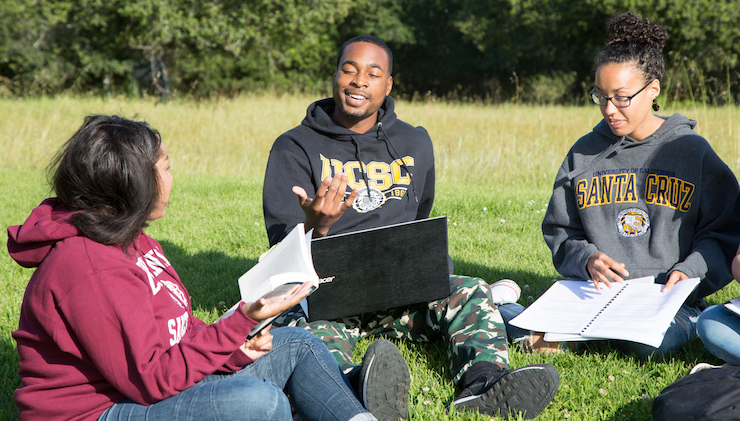Student Course Endorsements
Not sure whether to take a course? Check out what past students had to say...
- ANTH 1: Introduction to Biological Anthropology
- ANTH 2: Introduction to Cultural Anthropology
- ANTH 3: Introduction to Archaeology
- ANTH 97: Laboratory Safety
- ANTH 100: History and Theory of Biological Anthropology
- ANTH 101: Human Evolution
- ANTH 102A: Human Skeletal Biology
- ANTH 103: Forensic Anthropology
- ANTH 104: Human Variation and Adaptation
- ANTH 105: Human Paleopathology
- ANTH 106: Primate Behavior and Ecology
- ANTH 107: Methods and Research in Molecular Anthropology
- ANTH 107B: Methods and Materials in Stable Isotopes
- ANTH 108: Neanderthals
- ANTH 110A: Public Life and Contemporary Issues
- ANTH 110B: From Indiana Jones to Stonehenge: Archaeology as Popular Culture
- ANTH 110F: Evolution of Human Diet
- ANTH 110I: Cultures of Sustainability and Social Justice
- ANTH 110Q: Queer Sexuality in Black Popular Culture
- ANTH 110S: Think We Must! Anthropology and the Everyday
- ANTH 110T: Motherhood in American Culture
- ANTH 110U: Anthropology of Science
- ANTH 110W: Land and Waterscapes Entropology
- ANTH 125: Magic, Science, and Religion
- ANTH 129: Beyond Borders: Other Globalizations and Histories of Interconnection
- ANTH 130A: Peoples and Cultures of Africa
- ANTH 130F: Blacknees in Motion: Anthropology of the African Diasporas
- ANTH 130I: Cultures of India
- ANTH 130L: Ethnographies of Latin America
- ANTH 130O: Native Feminisms, Gender, and Settler Colonialism
- ANTH 131: Gender in Cross-Cultural Context
- ANTH 130P: Anthropology of Southern Cone Chile and Argentina
- ANTH 130T: Religion and Politics of the Muslim World
- ANTH 134: Medical Anthropology: An Introduction
- ANTH 136: Biology of Everyday Life
- ANTH 139: Language and Culture
- ANTH 145X: Special Topics in Socio-Cultural Anthropology
- ANTH 146: Anthropology and the Environment
- ANTH 147: Anthropology and the Anthropocene
- ANTH 148: Gender and Global Development
- ANTH 150: Communicating Anthropology
- ANTH 151: Ethnography Workshop
- ANTH 152: Survey of Cultural Anthropological Theory
- ANTH 158: Feminist Ethnographies
- ANTH 159: Race and Anthropology
- ANTH 170: History of Archaeology Theory
- ANTH 172: Archaeological Research Design
- ANTH 176B: Meso-American Archaeology
- ANTH 176D: Colonial Encounters in the Americas
- ANTH 176F: California Archeology
- ANTH 179: Slavery in the Atlantic World
- ANTH 180/180L: Ceramic Analysis in Archaeology
- ANTH 182A: Lithic Technology
- ANTH 187: Cultural Heritage in Colonial Contexts
- ANTH 189: Archeaological Field Methods
- ANTH 194S: Hearing Culture: The Anthropology of Sound
- ANTH 194X: Women in Politics: A Third World Perspective
- ANTH 196G: Queer Worlds - Sexuality, Intimacy, and Power in Contemporary Ethnography
- ANTH 196R: Design Anthropology
- ANTH 196W: Anthropology of Weather and Exposure
ANTH 1: Introduction to Biological Anthropology
 Study of evolution illustrated by Pleistocene hominid fossils and variation in living human groups. Behavior and evolution of primates examined as they contribute to the understanding of human evolution.
Study of evolution illustrated by Pleistocene hominid fossils and variation in living human groups. Behavior and evolution of primates examined as they contribute to the understanding of human evolution. "This was my first introductory course in the Anthropology department with Professor Reti as a first-year in fall 2016. Professor Reti is a great lecturer and is very easy to follow along because despite the factual nature of biological anthropology, he made his lectures far more interactive and relatable. Sections were very hands-on and allowed students to see and study with real artifacts, bones, and real life scenarios that anthropologist face in the professional field, great way to see if this department is the best for you. Professor Reti was easy to reach out to, replied quickly to emails and he was good at debunking common urban myths about archaeology and human evolution (we do not evolve from monkeys!) which made it palatable and easy to follow. Lecture took up the whole time, meaning we never left early and doing the readings made the class more interesting and avoided feeling lost or behind in class. Scanning long sections is also helpful before lectures and exams are HEAVILY based on knowing the vocab, so go back and reread, make flashcards, study groups, and attend office hours if needed." -D., 2nd Year Anth Student, Winter ‘18
___
"The course... pushes the idea of studying humans and how they have evolved from the earliest primates, which is unique to the discipline. I loved attending lecture because we learned about biology, human evolution, and the anatomy of primates and the human body. There were clips and films shown in class to accompany lectures, and we wrote an article critique on a scientific article of our choosing relating to biological anthropology, which was a unique way to engage with the sub-discipline. This class was a great introduction to biological anthropology, and for those who are interested in becoming an anthropology major or minor, or want to get a taste of what anthropology is, this class is a great choice for you." -S., 2nd Year Anth Student, Spring '17
ANTH 2: Introduction to Cultural Anthropology
 A number of different peoples are studied and a variety of approaches to the nature of the culture and to the study of specific cultures presented. Required for all anthropology majors. GE Code: CC, IS
A number of different peoples are studied and a variety of approaches to the nature of the culture and to the study of specific cultures presented. Required for all anthropology majors. GE Code: CC, IS"I took this class as a sophomore when I was still undecided about declaring anthropology and after taking it I was a hundred percent convinced that this was the right major for me. When I took ANTH 2, the reading load was quite heavy and in addition to class readings, we were required to read an ethnography for section and watch documentaries on our own time. For a lower division course, ANTH 2 was pretty heavy but it definitely prepared me for the expectations of upper division courses. Even if you aren’t considering anthropology as a major or if you’re just testing the waters, I highly recommend this course." -I., 4th Year Anth Student, Spring '17
ANTH 3: Introduction to Archaeology
 Introduction to Archaeology gives you a solid foundation in archaeology since it covers history, myths, methods and contemporary issues in archaeology. With all the insight on careers and procedures in archaeology the course provides, you can get a good feel for the field. The discussion section is very interactive and provides a more practical idea of what it's like to work and think as an archaeologist. GE Code: SI
Introduction to Archaeology gives you a solid foundation in archaeology since it covers history, myths, methods and contemporary issues in archaeology. With all the insight on careers and procedures in archaeology the course provides, you can get a good feel for the field. The discussion section is very interactive and provides a more practical idea of what it's like to work and think as an archaeologist. GE Code: SI"While archaeology is only one of four major breadths in Anthropology, I would also say that this course still gives a good introduction to the anthropology department since there are many featured guest lectures who talk about their studies and research in archaeology. I appreciated seeing how archaeologists speculate how societies used to be based off of the materials left behind. This course also managed to make elements of the past relevant to today, and you might just enjoy going to museums more!" –S., 3rd Year Anth Student, Spring ‘18
ANTH 97: Laboratory Safety
 Covers laboratory health and safety and standard operating procedures within the anthropology laboratories. Prepares students for future laboratory research activities while providing support of laboratory administration, collections management, and laboratory course demonstration needs.
Covers laboratory health and safety and standard operating procedures within the anthropology laboratories. Prepares students for future laboratory research activities while providing support of laboratory administration, collections management, and laboratory course demonstration needs."This class was a lot more interesting than I was expecting! [Lab Manager Richard] Baldwin managed to take what could be a dry topic and make it both interesting and relevant. The lectures dealt with different topics related to laboratory safety. Often we spent class time doing hands-on safety simulations. This was a practical and engaging way to learn the material. The course requires a number of practical hours spent doing actual work in the laboratories. I got to learn a diverse range of skills from taking care of bug boxes, curating a comparative osteology collection, conducting dissections, and cleaning bones. I have a better idea of the day-to-day work in an anthropology laboratory and this has given me a better idea of what interests I may want to pursue in the future. I also feel more prepared to deal with safety situations as they arise in the laboratory. Overall, this was a very fun and informative class! I would recommend it to any student who would like to get involved with laboratory research and who would like to know how to mitigate hazards in a laboratory setting." - G., Spring '17
ANTH 100: History and Theory of Biological Anthropology
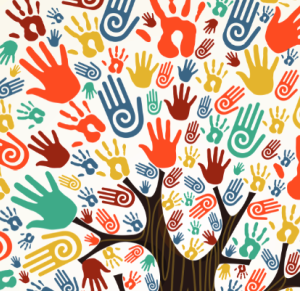 Provides an historical overview from the 18th century to the present of race, ape-human relationships, and human nature. Emergence of an evolutionary framework and of fossil, genetic, and primate information becomes the basis for reformulating ideas about human biology within anthropology. Prerequisite(s): ANTH 1, ANTH 2, and ANTH 3 and satisfaction of the Entry Level Writing and Composition requirements. (General Education Code(s): TA.)
Provides an historical overview from the 18th century to the present of race, ape-human relationships, and human nature. Emergence of an evolutionary framework and of fossil, genetic, and primate information becomes the basis for reformulating ideas about human biology within anthropology. Prerequisite(s): ANTH 1, ANTH 2, and ANTH 3 and satisfaction of the Entry Level Writing and Composition requirements. (General Education Code(s): TA.)“I took Anth-100 to fulfill the upper-division theory requirement for the major and my mind was entirely blown. I have always struggled with theory in every class I've taken but this class literally made everything click. A fair warning to the weary; the reading load is HEAVY, but every reading is very interesting and totally necessary to properly learn from the class. This is the type of class that you will still be thinking about years from now because you quite literally learn the history of the development of evolution and scientific explanation of nature. I absolutely recommend this class to anyone who is interested in evolutionary theory and biological anthropology, but definitely even out your class load while taking it.” –A., 4th Year ANTH Student, Fall 2019
ANTH 101: Human Evolution
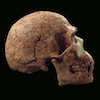 Study of human evolution covering the last five million years. Examines the fossil evidence and emphasizes the reconstruction of behavior from the paleontological and anatomical evidence.
Study of human evolution covering the last five million years. Examines the fossil evidence and emphasizes the reconstruction of behavior from the paleontological and anatomical evidence. “I took Anth 101 my sophomore year with Jay Reti. Human Evolution is a course that goes back six million years to analyze many species that evolved into Homo sapiens sapiens. This rigorous course covers a wide range of material having to do with human evolution such as taxonomy, dating techniques, and learning about each individual species that lived before us. I left this course with a deep understanding of what species before us looked like, ate, and how they behaved. It was extremely interesting and eye opening to make so many connections between why we are the way we are today to how our ancestors were millions of years ago.” –S., 3rd Year Anth Student, Fall ‘17
ANTH 102A: Human Skeletal Biology
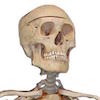 Presents basic human osteology allowing students to identify skeletal material by element. Emphasizes the dynamic nature of bone by integrating anatomy with a discussion of bone physiology within the context of the human life cycle. Prerequisite(s): course 1.
Presents basic human osteology allowing students to identify skeletal material by element. Emphasizes the dynamic nature of bone by integrating anatomy with a discussion of bone physiology within the context of the human life cycle. Prerequisite(s): course 1.“Human Skeletal Biology is a great class for anyone particularly interested in biological anthropology. This class gives you a great basis for skeletal anatomy that will be beneficial in any upper division bio-anthro classes. The class is structured to have weekly practical quizzes, which can seem daunting, but is actually extremely helpful for learning the material. It is important to keep in mind that you will need to spend extra hours outside of class time in the lab studying, but you are given a key code so you can study whenever it is convenient for you. It is a heavy workload, but by the end of the class you know so much about the human skeleton that it is worth the amount of work that you put in.” - A., 4th Year Anth Student, Winter ‘19
During summer before my junior year I took Human Skeletal Biology with professor Reti because I knew that it would be a difficult course to get into during the school year. At first I was a bit intimidated since it was a 5-week course, especially to the special attention I had to pay to the details in every bone fragment. The class did consist of frequent exams that would consist of labeling the little details and characteristics of the bones. To study for these exams, I would spend as much time as possible at the lab, hands on the bones to get comfortable to know the details. I would recommend the course to anyone who is interested in the physical aspects of anthropology because it’s a very rewarding class in which you go in know nothing to very little and leave knowing the entire skeletal system from bones to sutures. –S., 4th Year Anth Student, Fall ‘17
ANTH 103: Forensic Anthropology
 Covers the basic analysis of human skeletal remains for the medicolegal profession. Assessment of age, sex, ancestry, and general physical characteristics, trauma, and disease are discussed. Addresses the legal responsibilities of the anthropologist. Online lectures with in-class discussion sections, quizzes, and exams.
Covers the basic analysis of human skeletal remains for the medicolegal profession. Assessment of age, sex, ancestry, and general physical characteristics, trauma, and disease are discussed. Addresses the legal responsibilities of the anthropologist. Online lectures with in-class discussion sections, quizzes, and exams.“When I took this course in the summer of 2017, it was structured as a combination of online lectures and in-person lab experience, co-taught by Susan Kuzminsky and Alison Galloway. I thought this was an interesting and effective style of teaching, because it allowed me to watch and re-watch the lectures on my own time, which was helpful because a lot of the information covered was very detailed and required a lot of close attention. This also allowed for plenty of time for hands-on experience during the labs, in which we learned how to determine the sex, age, ancestry, and other features of human skeletal remains. I would recommend this class to anyone who is interested in forensics or biological anthropology.” -S., Third Year Anth Student, Spring '18
--
“This course is a wonderful introduction to the field of forensic anthropology which is growing in popularity. It requires the prerequisite of ANTH 102A, but it is well worth it. It is a combined online lecture/lab class that allows you to use the information learned with a hands on experience. Alongside Allison Galloway’s video lectures, her textbook used in the class is provided, which is amazing! Though I took it during COVID19, the online labs were still helpful and great in putting the theories into reality. The instructor is there for you and wants to help you ace this class, so don’t be afraid to reach out! Some of the topics covered were identifying animal vs humans remains, bullet wounds, and age analysis.” - A., 4thyear ANTH Student, F ‘20
ANTH 104: Human Variation and Adaptation
 Explores the major environmental factors (temperature, altitude, diet, and disease); how they are perceived by the human body; the physiological, micro- and macro-anatomical responses; and how behavior and culture can modify the impact of these stresses.
Explores the major environmental factors (temperature, altitude, diet, and disease); how they are perceived by the human body; the physiological, micro- and macro-anatomical responses; and how behavior and culture can modify the impact of these stresses.“Taught by the personable Lars Fehren-Schmitz, this course fulfills the Biological/Medical/Environmental anthropology requirement. It is interesting, humbling, and overall an enjoyable learning experience. This is a fantastic course to take with your potentially heavier upper division courses. Lars uploads all course materials and lecture presentations onto canvas for students to utilize. Topics throughout the course duration include: genotypes and phenotypes, gene-culture co-evolution like malaria and lactose tolerance, evolutionary forces and genetic variation, epigenetics, metagenomics, microbiomics, population history and human variation, immune system and disease, blood group variants, pigmentation, body size and shape, high altitude adaptation, climate, temperature regulation, and more. We had a guest lecturer, Dr. Richard “Ed” Green, and watch the first episode of a film series, Race: The power of an illusion. Grades are based off attendance/participation worth 10% of your grade, two 20-question exams worth 25% each, and a final assignment worth 40% that you have the option of choosing between, either a final exam of 30-40 questions or a final research paper of 3-pages with a group presentation of 10 minutes. The paper and presentation gives you a chance to use what you’ve learned in class and apply it to a topic that you are interested in sharing about. Lars makes the class fun with his straightforward personality, light humor, and style of presenting information that makes you feel as though you are having a conversation instead of being lectured at.” -E., 4th Year ANTH Student, Spring ’18
ANTH 105: Human Paleopathology
Examines paleopathology beginning with ancient hominid populations and proceeding to modern populations. Uses both the skeletal evidence and historical documentation when available. Considers evolutionary, cultural, and biological factors. Topics include: osteological diagnosis of infectious disease; trauma; nutritional deficiencies; dental disease; and developmental defects. Prerequisite(s): ANTH 1; ANTH 102A recommended.
“Human Paleopathology is an exciting look into the study of ancient diseases and their effects on our ancestors, some dating back to ancient times. In a wondrous mixture of both Archeology and Biological Anthropology, the class shows not only what kind of diseases plagued human societies in the past, but also what those diseases said about the people of the time. What interested me the most was how from how a group decided to take care of a person with an advanced disease, we were able to determine that the culture, or at least the local environment they lived in took care about its members, when many people think ancient peoples were all about the survival of the fittest. While ANTH 105 is in Biological/Medical anthropology field, I recommend this to anyone interested in anthropology in general, as it crosses into many other subfields and shows the lengths in which anthropology is cross disciplinary.” -C., 4th Year ANTH Student, Fall ‘20
ANTH 106: Primate Behavior and Ecology
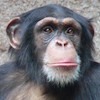 The nature of primate social systems and social bonds is examined in the light of evolutionary and ecological concepts. Students cannot receive credit for this course and course 206. Prerequisite(s): course 1.
The nature of primate social systems and social bonds is examined in the light of evolutionary and ecological concepts. Students cannot receive credit for this course and course 206. Prerequisite(s): course 1.“This class is extremely interesting for anyone who is remotely interested in the study of non-human primates. Many people go into this course with a small amount of knowledge regarding the subject, however you leave becoming a pro. This class is organized in a way that will allow you to understand the different types of non-human primates through many different aspects, but it also displays the different ways in which one would be able to study them as. Not only is this subject super cool, but the instructor is amazing as well. Vicky Oelze is the perfect person to teach this subject, not only does she have hands on experience within the field, but because of the pure passion she has for it as well.” –M., 4th Year Anthropology Student, Fall ‘17
--
“This class is a great experience to explore other fields of anthropology. It gives you a deeper understanding of primates and how similar/different humans grew from them. This course is formatted in a way that it’ll be easy to comprehend the material and be a primate master yourself. The lectures are engaging and contain everything you’d need for the midterm and final. Vicky Oleze also makes the class worthwhile as she’s had personal experience with primates and shows her dedication to the information being presented. It’s a wonderful class to join if looking to fill in a schedule or to find a niche within anthropology!” -A., 4th year ANTH Student, F ‘20
ANTH 107: Methods And Research In Molecular Anthropology
 Introduces the molecular analyses of anthropological questions and explores the intersection of genetics and anthropology. Covers the basic principles of molecular and population genetics as they relate to the study of humans. Prerequistie(s): courses 1 and 104. Course 102A is recommended.
Introduces the molecular analyses of anthropological questions and explores the intersection of genetics and anthropology. Covers the basic principles of molecular and population genetics as they relate to the study of humans. Prerequistie(s): courses 1 and 104. Course 102A is recommended.“My junior year I took methods and research in molecular anthropology, and I really enjoyed the experience. It is taught as a mixture between lecture and lab, and the class size is very small. In the class, you sample your own saliva, and will be able to test yourself for lactase persistence, whether you are a night person or morning person, and trace maternal ancestral DNA. The course readings were not overly consuming, relatively easy to do, and supported the course material. Group work will be required. Lars was a very passionate and helpful instructor. I would certainly recommend this class for hands-on experience in a lab setting and working on a molecular level with DNA, I would even take it again.” –Y., 4th Year Anth Student, Fall ‘17
ANTH 107B: Methods And Research In Stable Isotopes
 This combination of lectures, readings, discussions, and hands-on laboratory experience provides a comprehensive overview of stable isotope research to reconstruct diet and mobility. Discover the wide application of isotopic research in biological anthropology, bioarcheology, primatology and forensics.
This combination of lectures, readings, discussions, and hands-on laboratory experience provides a comprehensive overview of stable isotope research to reconstruct diet and mobility. Discover the wide application of isotopic research in biological anthropology, bioarcheology, primatology and forensics.“This class is very interesting and beneficial to anyone looking to explore methodologies and research in biological anthropology! The course material focuses around the different properties and uses of varying stable isotopes, such as Carbon and Nitrogen. Class time is structured into both lecture and lab sections, which allows students to practice isotopic laboratory processes and skill sets taught through lecture. The most enjoyable project thus far was exploring UC Santa Cruz’s Natural Reserve to collect forest samples. Students developed questions about the local ecology in order to test their isotopic values, which is a great way to actively learn in your own environment! I would highly recommend this class because of the exciting learning experience coupled with increased laboratory practice. If you have a passion for learning about stable isotope analysis, Vicky Oelze offers a fun and informative opportunity to get involved!” -T., 4th Year Anth Student, Spring '19
ANTH 108: Neanderthals
 Homo sapiens neanderthalensis (neanderthals), once considered brutish, are increasingly seen as behaviorally modern. This course uses primary academic research to explore the social behaviors, technology, anatomy, and genetics of neanderthals, gaining a holistic understanding of our closest ancestor. Prerequisite(s): course 1.
Homo sapiens neanderthalensis (neanderthals), once considered brutish, are increasingly seen as behaviorally modern. This course uses primary academic research to explore the social behaviors, technology, anatomy, and genetics of neanderthals, gaining a holistic understanding of our closest ancestor. Prerequisite(s): course 1.“I highly recommend taking Anthropology 108: Neanderthals taught by Jay Reti. This class focuses on looking at the history of mankind through a specific branch known as the Homo sapiens neanderthalensis. The class dives deep into the culture, lifestyle, and death of the Neanderthals and by the time it’s over, you’ll consider yourself an expert. By far, one of the best parts of the class was the ability to recreate the stone tools that they would have used in their time. It’s hard work and it really made me think about what life was like for them. I enjoyed how this class looked into all the different aspects of the Neanderthals, from their biology to their culture as well as what we can learn about our society via their remains. Overall, I would recommend this class to any and all anthropology students, especially those with an interest in human evolution. It expands on a lot of topics covered in Anthropology 1 and gives a taste for what the beginnings of humans were like.” -A., 4th Year ANTH Student, F ‘18
ANTH 110A: Public Life and Contemporary Issues
 How can cultural anthropology help us to understand current events unfolding locally, nationally, and globally? Students learn how to "read" newspapers differently--that is, through the lens of cultural analysis. The world of everyday politics and society, as it unfolds in debates happening right now, forms the topical substance of the course. GE Code: IM
How can cultural anthropology help us to understand current events unfolding locally, nationally, and globally? Students learn how to "read" newspapers differently--that is, through the lens of cultural analysis. The world of everyday politics and society, as it unfolds in debates happening right now, forms the topical substance of the course. GE Code: IM"Public Life and Contemporary Issues was an enthusiastic and thought-provoking class covering why and how the media chooses to report their news and information. One of the most valuable teachings this class has given me is to 'read between the lines'; to think of what the media source is, why a media outlet decides to use certain terms or connotations over others, and how media affects its consumers, are all fundamental elements in understanding the information we receive. A memorable example of this class was watching the film “Miss Representation,” which focused on how women are represented in the media. Miss Representation exemplifies the ways in which society views/depicts women and how women are poorly affected by their representation in the media." -M., Spring '17
--
"This was my favorite class I've ever taken. It really changed the foundations of how I view the world, and now I can't read a news article without picking apart the exact word choice and framing used therein. ... This class was like reading your favorite book for the very first time. ... The homework of the class was mostly in the form of weekly news reading assignments, as well as a standard suite of readings. ... A big part of the class was learning how to identify the political spin and connotation of words, and then applying that knowledge to the weekly assignments." --A., 4th Year Anth Student, Winter '17
ANTH 110B: From Indiana Jones to Stonehenge: Archaeology as Popular Culture
 Addresses the "meaning" of archaeology as generated in television, movies, literature, newspapers, and even National Geographic. Students engage with several case-studies illustrating how archaeology is portrayed in popular culture. GE Code: IM
Addresses the "meaning" of archaeology as generated in television, movies, literature, newspapers, and even National Geographic. Students engage with several case-studies illustrating how archaeology is portrayed in popular culture. GE Code: IM"This course has interesting weekly readings that makes engaging in class discussions natural because we can relate to everyday connections and cultures. The two critical essays are fun to write and the group project is exciting as it pertains to an archaeological site, culture or concept that you and your group are interested in researching and presenting. This course challenges the misconceptions and general stereotypes of what it means to be an archaeologist or anthropologist and connects those ideas to current everyday lives, as well as tying it into how we study and learn from the past. This course is so fantastic because the professor teaches with honesty, which breaks the tension with a style of comic relief that creates a welcoming environment for students to speak up and participate in class discussions or to simply comment on the reading material." -E., Spring '17
ANTH 110F: Evolution of Human Diet
 Presents the evolution of human diet and subsistence from a biological anthropological perspective. Covers the key hypothesis and methodologies related to diet, from our early fossil ancestors up to agriculture and animal husbandry. GE Code: PE-H
Presents the evolution of human diet and subsistence from a biological anthropological perspective. Covers the key hypothesis and methodologies related to diet, from our early fossil ancestors up to agriculture and animal husbandry. GE Code: PE-H"If you are interested in learning about the evolution of the human diet, this class is for you! ANTH 110F is taught by Vicky M. Oelze. She is really passionate about the subject and always made sure students understood the course material. Her lectures were filled with enthusiasm, which made it very engaging. Many interesting topics were covered, like probiotic biomes, teeth, and cooking. Sounds really random, right? But in fact it is quite interesting! I learned that probiotic biomes reflect where you come from and your history. Also, when looking at teeth you can see what type of consumer you are. Did you know that our brains grew once we started cooking? If you didn’t, well, now you know and there are more fascinating things to learn about in this class! It’s a fun class, with a not so heavy workload. There were weekly readings, a midterm, 3 quizzes, and a final. The professor would share the slides with us, with highlighted information, to help us know which information was important. Overall It’s a great class to take!" -B., 3rd Year Anth Student, Winter ‘18
--
"The human evolution diet is a course that explores the dietary substance of our ancient ancestors through dietary methods to reconstruct the ancient diet and evidence base. During the course we learn the various subsistence strategies humans engage in hunter-gathers, Auguste hunter, Equestrian pastoralism, intensive agriculture, and subsistence strategies. The course decissed Professor Oelze teaches a diverse course, for example, ANTH 106- Primate Behavior Ecology, ANTH 107C - Chimpanzee Behavior & Culture (Lab), ANTH 103B - Forensic Anthropology & Bioarchaeology, ANTH 110F - Evolution of Human Diet, ANTH 294R during the academic year. If you are interested in human evolution, take a course with Professor Oelez, who is an amazing professor." -J., 4th-year ANTH Student, Fall ‘20.
ANTH 110I: Cultures Of Sustainability And Social Justice (Online)
 This online course brings together diverse forms of cultural knowledge and complexities of everyday life to illuminate longstanding concerns of sustainability and justice. It investigates multiple theories of sustainable development as well as tools, techniques, and contexts for ecological integrity, economic security, empowerment, responsibility and social well-being characteristic of sustainable communities. Case studies are drawn from the global work of Right Livelihood Award Laureates in tandem with UC faculty. GE Code: PE-E
This online course brings together diverse forms of cultural knowledge and complexities of everyday life to illuminate longstanding concerns of sustainability and justice. It investigates multiple theories of sustainable development as well as tools, techniques, and contexts for ecological integrity, economic security, empowerment, responsibility and social well-being characteristic of sustainable communities. Case studies are drawn from the global work of Right Livelihood Award Laureates in tandem with UC faculty. GE Code: PE-E"This course has not only broadened our horizons on various topics, but has allowed us to understand the complexity behind common terminology used everyday. For example, terms such as agroecology and climate change mean more than the dictionary definitions, and this class truly taught us that. We were taught to ask the questions who gets affected by climate change? What are the various viewpoints? It taught us that these words are attached to faces, stories, communities, and real world implications. As aspiring Anthropologists, this class taught us that the job of social activism and change is not put on the shoulders of a single discipline, however, it is transdisciplinary practices that allow for great change. Moreover, this course has also allowed us to gain confidence in establishing our own research, talking to other established Anthropologists, and solidified our position in the world in order to create the changes needed. This course is perfect for all individuals aspiring to learn more about the world and how to change it sustainably for the better. Throughout the course students are introduced to Right Livelihood Laureates from all possible career paths in order to teach students that all parts of society can and are needed in order to establish social change. This aspect of the course had helped us in planning our own future careers and aspiring goals. We are hopeful in creating sustainable change and we feel that more collaboration between RLA Laureates and the UC system would encourage more students to do so as well!" -L. and N., UC Irvine Students, Fall '18
ANTH 110Q: Queer Sexuality in Black Popular Culture
 From Janet Mock to Young M.A., queerness has become hypervisible in Black popular culture--but at what cost? Using music, television, and social media as central texts, students investigate the intersections of sexuality, gender, and race in public life. GE Code: IM
From Janet Mock to Young M.A., queerness has become hypervisible in Black popular culture--but at what cost? Using music, television, and social media as central texts, students investigate the intersections of sexuality, gender, and race in public life. GE Code: IM“I took Queer Sexuality In Black Popular Culture in Fall 2018 with Professor Shange, her first quarter teaching here at UCSC. This class has been one of my favorite classes I’ve taken yet. All the readings assigned were very interesting and relevant to today, which makes discussions in and out of class a lot more collaborative and fun. There were multiple readings assigned per lecture, however Professor Shange did review the larger concepts of the readings, which helped fully understand the themes of the course. Because the class was framed around queerness among Black pop culture, we talked a lot about the portrayal of queer people of color in media including, music videos, films, interviews, and had the honor to video chat with Kai Green, the author of one of the readings assigned. We had a media review paper for our midterm and an option of a creative project (which was so much fun!) or another paper, both options done in groups of 4-5 students. Overall, I highly recommend this class to anybody that is ready to challenge white queerness and heteronormative concepts in media.” - D., 3rd Year Anth Student, Winter ‘19
ANTH 110S: Think We Must! Anthropology and the Everyday
 In this course, students will treat common sense practical activities as observable as well as ways of knowing and making the world through a survey of anthropological literature that considers social organization as an accomplishment with others.
In this course, students will treat common sense practical activities as observable as well as ways of knowing and making the world through a survey of anthropological literature that considers social organization as an accomplishment with others."The Anthropology of Everyday Life is taught by Rachel Cypher. The class itself is a very good overview of anthropology and it provides an anthropological breakdown of our everyday functions and systems, including family systems, health, etc. Cypher’s goal is to make the normal weird by de-naturalizing aspects of life we take for granted. Cypher is an interactive professor who personalizes the class setting by getting the students to participate with one another and I met some new friends! Expect a lot of readings but expect them to all be interesting as well. Cypher is a very friendly and approachable teacher and I would highly recommend any of her classes." -S., 4th Year Anth Student, Winter ‘18
ANTH 110T: Motherhood in American Culture
 Examines the "culture wars" around motherhood in the United States with a focus on the political mobilization of normative ideas about the correct way to mother, from the moment of conception on. Special attention is given to the historical construction of deviant motherhood among marginalized groups.
Examines the "culture wars" around motherhood in the United States with a focus on the political mobilization of normative ideas about the correct way to mother, from the moment of conception on. Special attention is given to the historical construction of deviant motherhood among marginalized groups.“Motherhood in American Culture is a really interesting class. The course examines motherhood and how the experience of motherhood is affected by gender, race, sexuality, and class in the USA. You don’t have to want to be a mom to enjoy this course! The lectures cover topics such as memoirs on motherhood, the politics and institutions surrounding birth, what makes motherhood difficult or wonderful in the USA, and reproductive justice. The class is loaded with relatively easy reads that you may even want to do for fun. The assignments are manageable and thought provoking, with many small/medium-scale assignments and one take-home final. The class includes and encourages people from different walks of life and disciplines. For instance, if you are interested in literature and memoir writing, this class will suit you!” - S., 4th Year Anth Student, Winter ‘19
ANTH 110U: Anthropology of Science
 Examines science and technology through an anthropological lens, focusing on ethnographic studies of scientific practice and relations between science and society. Looks at studies theorizing core scientific elements and focuses on qualitative, empirically based studies of scientific practice.
Examines science and technology through an anthropological lens, focusing on ethnographic studies of scientific practice and relations between science and society. Looks at studies theorizing core scientific elements and focuses on qualitative, empirically based studies of scientific practice.“The class focused on the relationship between science and society. Through various readings, students come to dissect scientific processes through an anthropological lens. The instructor had us write weekly responses to articles that were to be read for the week, and although this felt like a lot at the time, I realized later on that they really helped me digest the readings and to make connections between each topic. Through these responses I was able to express ideas that I found interesting or disturbing and share them with the instructor. To any student interested in taking this class, I would suggest first and foremost to keep an open mind. We often come into classes with our own assumptions about how the world works, and as anthropology students many of our assumptions come to change gradually or abruptly. This class is no exception. This class, in a way, questions how our reality is structured as one that depends on scientific and technological discoveries.” -J., 4th Year ANTH Student, F ‘18
ANTH 110W: Land and Waterscapes Entropology
 Establishes anthropological interconnections of emergent worlds where environmental matters, social justice, and human survival interrelate. Focuses on anti-essential nature and waterscape ethnographies in which different pluricultures revalidate local understandings as ways of contesting increasing forms of land and water privatization. GE Code: PE-E
Establishes anthropological interconnections of emergent worlds where environmental matters, social justice, and human survival interrelate. Focuses on anti-essential nature and waterscape ethnographies in which different pluricultures revalidate local understandings as ways of contesting increasing forms of land and water privatization. GE Code: PE-E"If you’re interested in understanding forms of land and water privatization, impacts of globalization and global warming, as well as several other issues concerning nature and its’ dispossession, this is the class to take. This class connects environmental matters, social justice, and how humans initiate change regarding issues that impact their own lives. For a group project, which is a core component of the class, we researched mercury poisoning and how it came to impact the human body. I learned a lot about how much power transnational corporations hold, as well as the carelessness for human viability and sustenance, and the impacts mercury has within our oceans and the human body. This class never felt short of being interesting; it keeps you thinking long after you leave the classroom." -M., Spring '17
ANTH 125: Magic, Science, and Religion
 With a theoretical understanding of the concepts of magic, science, and religion, students draw on ethnographies of these practices to critique distinctions between them and critically analyze the understanding of these categories and their relation in the modern world. GE Code: PE-H
With a theoretical understanding of the concepts of magic, science, and religion, students draw on ethnographies of these practices to critique distinctions between them and critically analyze the understanding of these categories and their relation in the modern world. GE Code: PE-H“Professor Pandey centers the course on the ways in which magic, science, and religion interact with each other and how our modern views of the concepts have shifted. We covered various religions ranging from Hinduism to Hmong shamanism and the cultural spaces where they are practiced. It was particularly interesting to see how each religion has shifted as a result of external factors and to further explore and attempt to define the difference between religion and magic. We had readings to complete for each class period, including ethnographies and articles (including the professor’s own research), which prompted class discussion and allowed the students to observe their own role in the propagation and alteration of magic, science, and religion. Additionally, Professor Pandey was so easy to talk to about any topic and very enthusiastic about the class, making each lecture time really fun!” - M., 4th Year Anth Student, Spring '19
--
"Magic, Sciences, and Religion with Professor Pandey is one class I will never regret taking. ANTH 125 will present ethnographies of various practices of witchcraft, sorcery, divination, spirit, possession, Shamanism, and more. The student will see the relationship between magic, science, and religion through an anthropological sense while also critiquing them. Professor Pandey is one helpful instructor that will stay after class to aid you in what you are confused about or piques your interest. The readings for the course are dense, and Pandey expects the students to read because the readings do assist with the pop quizzes, a take-home midterm, and final exam. Even though there are many readings, they are never boring. Pandey goes deep into the readings every class, so it is wise to take detailed notes. Throughout the class, I have learned to place a new perspective on magic, science, and religion, along with ideologies and practices around the world. Learning the influences of these crucial aspects and connecting them to my life and the world, I have come to understand a new sense of human behavior." –C., 4th Year ANTH Student, Winter ‘20
anth129
ANTH 129: Beyond Borders: Other Globalizations and Histories of Interconnection
 The history of social and cultural interconnections at a global scale. Anthropological approaches to the study of cultural encounter are used to investigate topics such as trade, religion, and citizenship and to evaluate shifting concepts of civilization and barbarism. (Formerly Other Globalizations: Cultures and Histories of Interconnection.) Prerequisite(s): ANTH 2.
The history of social and cultural interconnections at a global scale. Anthropological approaches to the study of cultural encounter are used to investigate topics such as trade, religion, and citizenship and to evaluate shifting concepts of civilization and barbarism. (Formerly Other Globalizations: Cultures and Histories of Interconnection.) Prerequisite(s): ANTH 2.
“Beyond Borders is taught by Professor Nidhi Mahajan. The class covers the history of the crisis at the US, Mexico border and the global interconnections and commodities that come into play when analyzing the issue. Each week focuses on a theme and oftentimes the professor has a guest lecturer come in to speak which added additional perspectives to a multifaceted subject. There are many opportunities for class discussion and group activity which helps students to gain a complete and honest understanding of a highly complex subject. This class is great for students who are particularly self-motivated as the class is reading heavy and includes take-home exams. Professor Mahajan always keeps lectures engaging and though the class is quite reading heavy, she breaks down the difficult anthropological jargon to make it understandable. This has made the readings enjoyable and intriguing. One of my favorite readings was an ethnography titled The Land of Open Graves which recounted one family’s’ grueling migration across multiple borders, both physically and emotionally.” –L., 4th Year ANTH Student, Fall 2019ANTH 130A: Peoples and Cultures of Africa
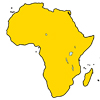 Survey of sub-Saharan societies. Analysis of principles of social organization and factors of cultural unity of selected western, eastern, central, and southern African peoples. GE Code: CC
Survey of sub-Saharan societies. Analysis of principles of social organization and factors of cultural unity of selected western, eastern, central, and southern African peoples. GE Code: CC“Peoples and Cultures of Africa was a unique look at the African continent and the internal and external forces that shaped it. Professor Mahajan spent the majority of the quarter focusing in on how colonialism affected the economic, social, and political development of various African nations, including the Democratic Republic of the Congo, Kenya, and South Africa. I had previously learned about historic moments in African history in high school but I never knew what kind of effect colonialism, imperialism, and Europe had in the development and progress of African nations so the material was totally new to me. The readings assigned for each class time, which covered a variety of topics including witchcraft and sexuality, assisted in debunking what stereotypes have been perpetuated. The readings and the professor's passion really made the course enjoyable and I would highly recommend this course to anthropology students of all focuses.” - M., 4th Year Anth Student, Winter ‘19
ANTH 130F: Blackness in Motion: Anthropology of The African Diasporas
What connects Black communities in the Caribbean, the U.S., Latin America, and Canada, and what sets them apart? Examines theories of diaspora, gender and sexuality, slavery, colorism, music, U.S. hegemonies, social movements, and comparative racialization and global anti-blackness (Formerly African Diasporas in the Americas.) (Also offered as Critical Race & Ethnic Studies 130. Students cannot receive credit for both courses.) (General Education Code(s): CC.)
“This class satisfies the regional section of anthropology. Taking “Blackness in Motion” will teach you Africa diaspora, South America and their influence on gender and race movement. This class will open your perspective in how you view yourself and society. It makes you more aware of the problems at hand in the world. While in class, reading responses are required and reading is recommended to pass. There may be a lot of reading, yet they connect to each other and real-life events. Class contains hands on group work which may be a make or break it moment for some individuals. The professor was helpful and gives feedback in assignments. One main project is required which was an ethnographic project. This project gives you the opportunity to open up to stranger by conducting interviews. This project made me realizes what I did and did not want to do as a career.” –A., 3rdh Year ANTH Student, Fall 2019
ANTH 130I: Cultures of India
 An examination of anthropological studies of tribal, rural, and urban cultures of India and a look at changes taking place in India. GE Code: CC, E
An examination of anthropological studies of tribal, rural, and urban cultures of India and a look at changes taking place in India. GE Code: CC, E"Cultures of India is one of the best classes I have ever taken at UCSC! Professor Annapurna Pandey is really passionate about the subject and always made sure students understood the course material. If you are interested in taking a class that covers social issues and movements, customs, traditions and politics in India, then this class is for you. One of my favorite topics that we covered in class was the rise of social movements, particularly amongst women. I think a lot of people have this perception of non-Western countries as being too traditional and oppressive so it was really interesting to learn about the different ways in which the people of India, specifically women, use social movements, such as “Why Loiter” to reclaim public spaces, empower each other and defy these perceptions. The reading and course loads were a little heavy at times but nothing new for an upper division course. Some of the readings were available online as pdfs and most of the books required were on reserve at McHenry, which is perfect if you want to take a course but don’t want to spend a ton on the books! This course had an accompanying section which I felt really helped me better understand the topics we were covering in lecture. At the end of the course I felt like I had really learned a lot about India and Pandey was a really good professor to learn from." -I., 4th Year Anth Student, Spring '17
ANTH 130L: Ethnographies of Latin America
 A broad introduction to issues and areas of cultural production and transformation in the Caribbean, Mexico, and Central and South America. Colonial, neocolonial, class, ethnic, gender, religious, ecological, and political relations intersect as represented in ethnographies and film. GE Code: CC
A broad introduction to issues and areas of cultural production and transformation in the Caribbean, Mexico, and Central and South America. Colonial, neocolonial, class, ethnic, gender, religious, ecological, and political relations intersect as represented in ethnographies and film. GE Code: CC“Taught by Guillermo Delgado, this course fulfills the Regional Specialization anthropology major requirement through the exploration of topics such as the capitalism and colonialism in Latin America, indigenous cultures and activism, and different perspectives on humans’ interrelationships with nature. This course does require a lot of reading, but each piece is engaging and thought-provoking. I particularly enjoyed reading How Forests Think by Eduardo Kohn, which talks about the concepts of selfhood, spirituality, and cosmo-centricity, in ways that I had never thought of before. I would recommend this class to anyone who is interested in Latin American cultures, spirituality, and activism.” -S., Third Year Anth Student, Spring ‘18
ANTH 130O: Native Feminisms, Gender, and Settler Colonialism
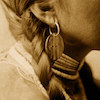 Covers Native feminisms, gender, settler colonialism, and ethnography. Students read ethnographies that intervene in Native feminisms and its possibilities. Focuses on ethnographies in the U.S., including Native men and masculinities in Hawaii. GE Code: ER
Covers Native feminisms, gender, settler colonialism, and ethnography. Students read ethnographies that intervene in Native feminisms and its possibilities. Focuses on ethnographies in the U.S., including Native men and masculinities in Hawaii. GE Code: ER"The course was taught by Professor Renya Ramirez, focusing on the Native American decolonization activities and the indigenous feminist movement. During the course, we read and discussed some ethnographies about indigenous feminist activities, as well as watched a number of video materials including conference panels, documentaries, and films. I was so amazed that there are big differences between indigenous feminism and Western feminism. Indigenous feminism focuses on people’s responsibilities rather than rights, for no matter male or female. Most importantly, the core of indigenous feminism is not to emphasize gender, but to weaken the concept of gender differences: Everyone has both the attributes of feminine and masculine. People gain the understandings of both attributes, then they can recognize the world and lives. Such an idea is a precious heritage of indigenous culture. In this era, when people gradually forgot the pains of Indians, the soul wounds brought by genocide still entangled the natives - Fortunately, native feminist movement can help indigenous descendants to recall their culture, cure the soul wound! I would like to recommend this course to people interested in gender studies, indigenous cultural studies, and feminist activities."
-Y., 4th Year Anth Student, Spring '19
"I took ANTH 1300 with Professor Renya Ramirez during my first Winter quarter as a transfer student. Professor Ramirez is very helpful and encourages the class to do their best. The lectures, readings, and group presentations create a very supportive and accommodating class setting. This course focuses on ethnographies done by Native feminist scholars and how, through this native feminist lens, we can create an alternative narrative of feminist ethnography that focuses on Indigenous women and the empowerment and challenges they face. The group presentations are based on the readings, and the films focus on native feminist narratives and the boarding schools that took so many indigenous children out of their families and forced them to assimilate into the white heteronormative culture. There is also an in-class midterm and a final that focused on the readings for the class. I have taken several courses with Professor Ramirez, and what I love about her classes is that she wants you to learn and doesn’t make the course work more difficult than it should be. The readings and films are very informative and give you an insight into the importance of native feminism and bringing indigenous narratives into the light."
-C., 4th Year ANTH Student, Winter ‘20
ANTH 130P: Ethnography of Southern Cone Chile and Argentina
 Chile and Argentina, although both established within Spanish colonization and physically close, have dissimilar histories and culture. We explore areas of friction and overlap that shaped different peoples, institutions, cultural identities, and histories in countries that share a particular history. (General Education Code(s): ER.)
Chile and Argentina, although both established within Spanish colonization and physically close, have dissimilar histories and culture. We explore areas of friction and overlap that shaped different peoples, institutions, cultural identities, and histories in countries that share a particular history. (General Education Code(s): ER.)“I took Anth 130P with Dr. Alejandra Kramer my first quarter at UCSC as a transfer student. The course covers Chilean and Argentinian geography, tradition, and history that all come together to form an understanding of their surviving cultures. Though both countries’ borders touch each other, they could not be more different, and this is something that I found the most interesting. The readings assigned, films we watched, and lectures given all were extremely helpful on the midterm, final, and final paper!” -B., 4th Year ANTH Student, F ‘18
ANTH 130T: Religion and Politics in the Muslim World
 Analyzes post-colonial forms of Islam, with particular attention to Muslim societies and cultures in the Middle East, North Africa, and Europe. Emphasizes the relationship between power, knowledge, and representation in anthropological approaches to Islam and Muslims. GE Code: CC, E
Analyzes post-colonial forms of Islam, with particular attention to Muslim societies and cultures in the Middle East, North Africa, and Europe. Emphasizes the relationship between power, knowledge, and representation in anthropological approaches to Islam and Muslims. GE Code: CC, E
“This course was one of my first upper division courses here at UCSC. Before I took it, I knew that I had a general interest in cultural anthropology based off of my experience in the introduction class. In Politics and Religion in the Muslim World, my passion for anthropology increased considerably. Many are interested in this field of study because they have a desire to learn about cultures which are different than their own. In this class, Fernando engages the students to critically think about why they have a passion to explore the Muslim world. Imperialism and colonialism have shaped our lives, and this class shows that we must be conscious of this. The history of discrimination which has been targeted at Muslims is a focus that the professor really elaborates on.One of my favorite aspects of this course was the way that Fernando structured the class. All of the readings were very engaging and showed different styles of ethnography, the homework was a number of short essays instead of two long essays, and she made it so that even in the class of about 60 students it was still very interactive. Also, it made a difference to me that she made the attempt to get to know everyone’s names.” -M., 3rd year Anth Student, Winter 2019.
"I chose this class because it was an incredibly topical subject matter after the presidential election. I wanted to better understand the roots of Islamophobia in the US and Europe and how these ideas emerged in popular media. By the end of the class I had learned a lot about the effects of colonialism and codification and how these processes have shaped our perceptions of contemporary Islam. My favorite aspect of the class was reading An Enchanted Modern by Lara Deeb, a book that challenges stereotypes of women and Islam with its insightful enthnographic research." -M., Spring '17
ANTH 131: Gender in Cross-Cultural Context
 Examines the diversity of women's as well as men's roles, experiences, and self-conceptions in a number of societies to explore how women and men shape, and are shaped by, particular forms of social life.
Examines the diversity of women's as well as men's roles, experiences, and self-conceptions in a number of societies to explore how women and men shape, and are shaped by, particular forms of social life.“This class was incredibly eye opening and both academically and emotionally stimulating. We read ethnographic works and memoirs as a part of the curriculum. These readings dealt primarily with the many imposed gender roles on both men and women and weren’t hard to digest at all. The language used was very accessible however, the content at times was very heavy and emotionally draining. Over all, the class emphasizes very heavily the idea that gender is a kind of culturally and socially constructed identity that is typically forcibly thrust upon individuals by the social, political, and economic aspects of their lives. The work we did in this class consisted of reading and writing a few papers here and there. There were two in-class exams and two presentations that made up the majority of our grade. Professor Renya Ramirez prepared us really well for this work and made the whole class really interesting and set it up so that her students would definitely succeed. I loved this class because I entered it believing that we would be looking only at the ways in which women are seen through a cross-cultural context and I could not have been more wrong. Professor Ramirez made sure to include the ways in which men are seen in this context as well, which I thought was really cool because in most classes with feminist undertones such as this one, the male perspective is completely thrown out the window which I believe can sometimes be a bit problematic. I would highly recommend this class to anyone and everyone but specifically to students with an interest in activist anthropology because it is highly relevant to issues we face in modern societies and really inspires students to do something about the injustices we face on a day-to-day basis.” -B., 2nd Year Anth Student, Spring '19
ANTH 134: Medical Anthropology: An Introduction
 Cross-cultural study of health, disease, and illness behavior from ecological and ethnomedical perspectives. Implications for biomedical health care policy.
Cross-cultural study of health, disease, and illness behavior from ecological and ethnomedical perspectives. Implications for biomedical health care policy."This class was the most intriguing course I have ever taken in the anthropology department, and sparked my passion for medical anthropology. We read ethnographies covering a variety of topics like: documenting the lives of immigrant farmworkers in California’s Central Valley, the efficacy of Tibetan medicine in comparison with Western biomedicine, and how individuals live with and are affected by injury and disability in gangland Chicago. The homework consisted of reading ethnographies or online articles, which were then reviewed in greater detail in lecture and section. I loved this class because in every lecture, Nancy Chen, the professor, spread her passion for medical and cultural anthropology to us, made the atmosphere in the classroom lighthearted and welcoming, and assigned readings and essays that pushed us to delve deeper into medical anthropology, and compare the ways it is interpreted and utilized around the world." -S., 2nd Year Anth Student, Spring '17
“Medical Anthropology is an extremely relevant discipline; it helps us understand the human experience through cultural concepts of disease and treatment, and gives us the tools necessary to aid in the improvement of global health. I highly recommend this class to all students interested in concepts of disease, biology, environment, and medical practices.” –S., 4th Year Anthropology Student, Fall ‘17
“The Introduction to Medical Anthropology was an incredible class to be a part of. I initially thought that the class was going to be about the cultures that may develop within hospitals, the relationships between doctors and patients, etc. While we did talk about this at some point, the class really focused on the concepts of suffering, sickness, health, and medicine, and how their meaning and significance changes cross-culturally. The course included a substantial amount of reading but it was reading that the students couldn’t get enough of. There were personal accounts of the different medical systems from all over the world, readings that talked about holistic medical practices, critiques of pharmaceutical companies and capitalism in general, and their impact on societies. I can’t stress enough how much of an amazing class it was. It made me reevaluate both the ways in which I contribute or don’t contribute to society, the ways that I take care of myself, it made me more mindful of the things I put into my body, and it inspired me to want to pursue an education in Public or Global Health.” - B. 3rd Year ANTH Student, Fall 2019
ANTH 136: Biology of Everyday Life
 Addresses cross-cultural attitudes to the human body and its everyday biological concerns: sleeping, eating, breathing, sex, and defecation.
Addresses cross-cultural attitudes to the human body and its everyday biological concerns: sleeping, eating, breathing, sex, and defecation. I highly recommend taking Anthropology 136 (Bio of Everyday Life) as the course allowed me to have better contextual understanding of everyday practices and how they managed to become normalized. This class had a significant amount of really interesting readings that gave insight of how these practices become institutionally normalized and how medicalization is one of the major factors of this standardization. Having all those readings and our own opinions, we were able to have class discussions, giving our own understanding and perspective of these topics regarding normality. Having these discussions allowed us to have a broader sense of how each of us resonated with these medicalized understandings.
Having the seminar setting gave us students so much more voice and allowed us to better synthesize these topics. Because of the several differing ideas and the seminar setting, this class proved to be a good way of reflecting on how we work as individuals and how we work as a society. -B., Third Year Anth Student, Spring ‘18
ANTH 139: Language and Culture
 Examination of language system and language use in relationship to cultural contexts of communication in Western and non-Western societies. Topics include the Sapir-Whorf linguistic relativity hypothesis; linguistic constructions of gender; speech variation in relation to class, ethnicity, and national identity; and the emergence of self in communicative acts.
Examination of language system and language use in relationship to cultural contexts of communication in Western and non-Western societies. Topics include the Sapir-Whorf linguistic relativity hypothesis; linguistic constructions of gender; speech variation in relation to class, ethnicity, and national identity; and the emergence of self in communicative acts."Language and Culture was taught by Professor Brenneis. His lecturing style is very much like a conversation with the students, he does not use lecture slides at all, and asks a number of questions that guide him through the conversation. He mainly covers main points from the readings and gives some background about linguistics before we start to really focus on the cultural sense of language. This class gives the student the creative freedom and exploration for an ethnographic short paper (2 pages) that provides a good sense of some field work tactics. The project itself was easy, fun, encouraging, personal and interactive so it didn’t seem like a normal academic paper. The readings were really interesting and relatable. The course load was light with a couple of heavy reading that Professor Brenneis will elaborate on during class. Most of our grade was based on a final research group project and paper, where we had to transcribe a conversation that we recorded amongst a group of single gendered individuals to highlight the differences between language and gender and the role the gender norms play in our speech. Found it really interesting, allowed us to see diversity among cultures. He was also a fair grader and graded more on the process." -D., 2nd Year Anth Student, Winter ‘18
ANTH 145X: Special Topics in Socio-Cultural Anthropology
 Taught annually on a rotating basis. Each year's topic varies by instructor and is announced by the department.
Taught annually on a rotating basis. Each year's topic varies by instructor and is announced by the department. "The 145X series allows students to study unique and special topics within socio-cultural anthropology; meaning, the topic of the class changes quarter to quarter. I had the opportunity to take this class when the subject was the anthropology of activism with Lisa Rofel. In this class we had the chance to read and analyze older anthropological texts regarding activism and the histories of activism within the United States as well as more recent articles depicting the activism happening within current society. ... In addition to racial justice, we spent a decent amount of time talking about feminist movements and women’s rights activism. Overall, this was a fulfilling class that allowed for a crash course in the history of social justice movements as well as the implications of current activisms while allowing a space for analytical conversation and potential involvement in activism outside of the classroom." -N., 4th Year Anthropology Student, Spring '17
-
ANTH 146: Anthropology and the Environment
 Examines recent approaches to study of nature and the environment. Considers historical relationship between nature, science, and colonial expansion as well as key issues of contemporary environmental concern: conservation, environmental justice, and social movements.
Examines recent approaches to study of nature and the environment. Considers historical relationship between nature, science, and colonial expansion as well as key issues of contemporary environmental concern: conservation, environmental justice, and social movements.
"Andrew Mathews is one of my favorite lecturers, and I've only had this one class with him. The course sounds broad, but has a few specific focuses that are related to Mathews’s research in Italy and Mexico. One of the main focuses is how knowledge is generated, and how trust works from an anthropological perspective. Peasant farmers, their market, and the governmental bodies that impose regulations on them all contribute to a shared pool of knowledge, and the details of these interactions make a world of difference. Beyond this, a purposeful omission of information also has a profound impact on how knowledge is co-produced. The co-production of both knowledge and ignorance are equally important for anthropologists looking to understand the human element of politics. Implicit in this human element is trust, or a lack thereof, which is also covered in the class. Trust, fear, lies, and farming. It’s like Settlers of Catan meets Game of Thrones. ... There were more reading responses for this class than most I have taken, but they are are short and fairly straightforward, and the prompts give plenty of topics to expand on." -- A., 4th Year Anthropology Student, Spring '17 ANTH 147: Anthropology and the Anthropocene
Looks at how humans have lived with their environments in other times and places; the long-distance transfers of humans and other animals, as well as plants and microorganisms; and how we can best live in the Anthropocene. Prerequisite(s): ANTH 2. (General Education Code(s): PE-E.)
“I took ANTH 147 with professor Matthews, a sweet and helpful professor. The focus of ANTH 147 centered on global environmental change and how we as human beings have had a hand in this. We also looked into our impact on landscapes and the relationship we share with the environment. Trying to find the balance between caring for the environment and human interactions. The course work consists of weekly quizzes, two short papers, and a ten-page research final. This course is lecture based, but the professor includes short worded slides with photos. He links the photos to the readings and his own work. I was eager to take this class because I wanted to know more about how humans interact with the environment and the impact we create, yet we seem to not take notice or simply ignore. I was also interested in learning what exactly the Anthropocene is and why it’s important. On a side note, ANTH 147 satisfies the Sociocultural upper division requirement for the anthropology major. I highly recommend taking this class and learning more about our impact on the earth.” - C. 4th Year ANTH Student, Fall 2019
-
ANTH 148: Gender and Global Development
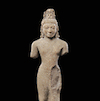 Uses the critical tools of feminist theory and cultural anthropology to look at how global development discourses and institutions mobilize, reinforce, and challenge systems of gender-based inequality. Topics include non-governmental organizations (NGOs), development practice, microcredit, and technocrat cultures.
Uses the critical tools of feminist theory and cultural anthropology to look at how global development discourses and institutions mobilize, reinforce, and challenge systems of gender-based inequality. Topics include non-governmental organizations (NGOs), development practice, microcredit, and technocrat cultures."I recommend this course for those that want to de-mystify the concept of “global development”. I chose this class because I was wondering about the ethics and effectiveness of NGO work abroad as well as government-sponsored work here in the US. I learned about these concepts as well as what it means to approach developmental work with an anthropological lense. At the end of this course I was inspired to further explore NGO work that tackles global development in innovation and new ways." -M., Spring '17
ANTH 150: Communicating Anthropology
 Encourages anthropology majors to explore different means of communicating anthropology with much attention to individual writing and presentation skills. Intensive work on library research; recognizing, comparing, and making arguments; and analyzing ethnographies, articles, reviews, and films. GE Code: W
Encourages anthropology majors to explore different means of communicating anthropology with much attention to individual writing and presentation skills. Intensive work on library research; recognizing, comparing, and making arguments; and analyzing ethnographies, articles, reviews, and films. GE Code: W"I took this class with Professor Fernando during my first quarter as a transfer student. My adviser recommended this course as a good way to prepare myself for upper division work in the major. I am VERY glad that I took my adviser’s advice — it was a great way for me to brush up on my writing skills and it was a good introduction to important theoretical concepts in the discipline. Fernando picked material that was both diverse and interesting. She also assigned material written by other faculty members at UCSC so it was a good introduction to the work that is being done in the department. The material provoked good discussions on ethical issues in anthropology and emerging trends in the discipline. This course also gave me the opportunity to conduct a mini-ethnography... Overall, the course was both informative and fun! It really helped prepare me for reading and writing in the discipline and I would recommend it to students who are preparing to do upper division coursework in the major." - G., Spring '17
ANTH 151: Ethnography Workshop
 Through demonstration, practice, and participation, acquire skills in collecting and analyzing cultural data. Learn to work with members of other cultures and with each other to develop skills in identify significant cultural patterns. Lectures and readings provide added perspective and a theoretical base. Especially recommended for students considering study abroad.
Through demonstration, practice, and participation, acquire skills in collecting and analyzing cultural data. Learn to work with members of other cultures and with each other to develop skills in identify significant cultural patterns. Lectures and readings provide added perspective and a theoretical base. Especially recommended for students considering study abroad."If you aren’t sure about writing a thesis, this is a safe way to test the waters and weigh your options without committing."
-A., 3rd Year ANTH Student, Winter '17
"I originally took this class because it was mentioned multiple times during Anthro 152 and I thought it would be a good way to apply the theories and concepts I learned from 152 into ethnographic work. In 151 we would have lecture one day of the week and the other was a workshop day in which we would put into practice what we learned during lecture. Such as practicing observations both in and outside of the classroom. It was really interesting learning how to conduct ethnography skills while working on our own ethnographies. One of my favorite assignments was to interview someone of our choice and it was really fun, and I was able to learn a lot. I would definitely take this class again and I recommend it for all anthropology students especially those in cultural, medical, and social, it's a valuable class."
-H., 4th Year ANTH Student, Winter ‘20
ANTH 152: Survey of Cultural Anthropological Theory
 Major figures, ideas, and writings in 19th- and 20th-century cultural anthropology surveyed.
Major figures, ideas, and writings in 19th- and 20th-century cultural anthropology surveyed."This course was very stimulating in its readings and I felt that the subsequent weekly lectures helped me understand the material on a much more personal level. Though I am not focused in cultural anthropology as other anthropology majors who took this course alongside me, I feel that the material taught allowed me to relate to the concentration better than I had before. I especially enjoyed reading the Nuer by E.E Pritchards and understanding “symbolic violence” by reading Pierre Bourdieu’s work in understanding society as a whole. I feel that by taking this theory course, anthropology students will be better suited for further upper division and possibly graduate level courses. Therefore, I strongly recommend students enroll in Anth. 152 if they are seeking a challenge and are interested in growing as young anthropologists." -J. 3rd Year ANTH Student, Winter’18
ANTH 158: Feminist Ethnographies
 Considers the relationship between anthropology and feminism. Provides historical perspective on gender inequalities in the discipline as well as the emergence of feminist anthropology. Students read and engage with examples of feminist ethnography form a variety of regions and subfields.
Considers the relationship between anthropology and feminism. Provides historical perspective on gender inequalities in the discipline as well as the emergence of feminist anthropology. Students read and engage with examples of feminist ethnography form a variety of regions and subfields.I took this course with Dr. Kramer during my senior year. As a student at UC Santa Cruz, we have been taught to observe how gender (and race) permeates culture and impacts societal issues; however, early anthropologists did not always take gender into account. This class highlights the history of early women anthropologists and how they worked to include women in ethnographies. In this class, we learned the history and development of feminist anthropology and the struggles early women anthropologists had in gaining a voice in the discipline. Kramer’s teaching style favors visual learners with Power Points, videos, and class discussions. Through reading articles and books written by women anthropologists, we were encouraged to question if the works could be considered feminist and/or ethnographies. I would definitely recommend this class to honor the women who helped shape anthropology as an inclusive, diverse subject and to also be inspired by their legacy. -K., Fourth Year Anth Student, Spring ‘18
ANTH 159: Race and Anthropology
 Examines concept of race in anthropology. Begins with histories of race in anthropology; turns to contemporary analysis of racism, identity formation, and diaspora; and concludes with current debates on the validity of "race" as an object of analysis. GE Code: ER
Examines concept of race in anthropology. Begins with histories of race in anthropology; turns to contemporary analysis of racism, identity formation, and diaspora; and concludes with current debates on the validity of "race" as an object of analysis. GE Code: ER"Professor Mark Anderson teaches Race and Anthropology. He is an engaging professor and creates a comfortable and open space for dialogue around a topic that can be very charged. The course itself is fairly interactive, there are several class forums where the students debate a given topic. The forums deepened my understandings of the readings and encouraged me to formulate coherent arguments based off of them. Anderson also goes over the readings in class which was very helpful, and he is a very friendly and approachable person so I never felt afraid to ask a question. The class itself is reading intensive but not too difficult, Anderson gives you the questions for the midterm ahead of time which makes the coursework very manageable and stress free, I didn’t even realize how much I was learning because the process was so stress-free. I recommend this class if you are interested in learning new perspectives and challenging old ones." -S., 4th Year Anth Student, Winter ‘18
ANTH 170: History of Archaeology Theory
 Historical review of prehistoric archaeology from antiquarianism to the present. Emphasis on development of archaeological theory and its relation to evolutionary and anthropological theory. Students cannot receive credit for this course and course 270. Prerequisite(s): course 3; satisfaction of the Entry Level Writing and Composition requirements. Enrollment is restricted to anthropology and Earth sciences/anthropology combined majors. GE Code: TA
Historical review of prehistoric archaeology from antiquarianism to the present. Emphasis on development of archaeological theory and its relation to evolutionary and anthropological theory. Students cannot receive credit for this course and course 270. Prerequisite(s): course 3; satisfaction of the Entry Level Writing and Composition requirements. Enrollment is restricted to anthropology and Earth sciences/anthropology combined majors. GE Code: TA“ANTH170 focuses on the history of archaeological theory. This is class is a must-take for anyone interested in the nitty-gritty details of archaeological theory. Tsim is very passionate about archaeology and his enthusiasm for the subject shows in his lectures, and he clearly cares about the success of all his students. He organizes the class in such a way that allows plenty of discussion and he is perfectly happy to spend that time clarifying anything from the class. Despite being a theory class, there is not a whole lot of writing--there are only two essays, which are fairly short--but there is a lot of reading with daily reading notes assignments to be turned in. At first I found these notes assignments daunting, but I soon realized that they not only helped me with my essays, but they also helped me with my precise writing skills, which I use in other classes. Even though my interest in anthropology is not centered in archaeology, I found this class to be very interesting and gave me a deeper understanding of what archaeology could provide when using different theoretical approaches. I would recommend this class to anyone who is serious about pursuing archaeological work in graduate school.” – S., 4th Year Anth Student, Winter ‘19
ANTH 172: Archaeological Research Design
 Develops practical skills for connecting archaeological theory and methods to grant writing, final reports and presentations. Examines elements of good research design, including the logic of scientific inquiry, ethics, project conceptualization, measurement, sampling, data analysis, and effective writing. General Education Code(s): PR-E
Develops practical skills for connecting archaeological theory and methods to grant writing, final reports and presentations. Examines elements of good research design, including the logic of scientific inquiry, ethics, project conceptualization, measurement, sampling, data analysis, and effective writing. General Education Code(s): PR-E"I took ANTH 172 in the spring quarter of my third year. I was not particularly interested in archaeology but taking this course was such a positive experience! Taught by Professor Judith Habicht-Mauche, this course is set up to introduce undergraduate students to academic writing for anthropological research and grant proposals. The main focus is to form an idea for a research project that you are interested in and then spend the quarter writing up a proposal for your hypothetical project and revising it to fulfill the expectations of real agencies. Each week, you examine successful proposals from students and professors, in addition to hearing about professors' funded projects from the professors themselves! By week 10, you will have a completed grant proposal in the style of a specific foundation and will present your research topic in front of the class. I learned a lot about the academia side of a career in archaeology and familiarized myself with grant writing. I highly recommend taking this course if you see yourself possibly writing academic articles in the future, if you're interested to know more about grants and how to earn them, or if you want to hear more about our university's professors' research." -M., 4th Year Anth Student, Fall '18
ANTH 176B: Meso-American Archaeology
Review of the archaeological and ethnohistorical evidence for the origins and development of pre-Columbian civilizations in Meso-America including the Olmec, Maya, Zapotec, Mixtec Teotihuacan, Toltec, Tarascan, and Aztec. Students cannot receive credit for this course and ANTH 276B. Prerequisite(s): ANTH 3.
“I took ANTH 176B with Professor Chelsea Blackmoore (no longer teaching at UCSC). The pace of the class is as expected for an upper-division course, but not too difficult. I decided to take this course to fulfill the regional specialization requirement and thought the course content would be interesting. Throughout the course, we received several assignments. I learned about a lot of interesting things: the Mayan number system, basic math equations, about the time periods of Meso-American archaeology, and I learned that a lot of churches in Meso-America were built over pyramids. I recommend this course to all Anthropology majors. The course is centered on learning archaeological findings of Meso-America. If you think you are not interested, you will become interested in at least one thing. All you need to take the course is ANTH 3 as terms are mentioned that you would have to have had previous exposure to. If you do not want to do a lot of hands-on, nitty-gritty archaeology, this course is a great overview. If you don’t particularly like archaeology, this course is not super technical.”
-- N., 4th Year ANTH Student, Winter ‘20
ANTH 176D: Colonial Encounters in the Americas
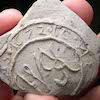 Uses archaeological case studies to explore processes of cultural confrontation, resistance, and transformation among Native American groups in the wake of European colonial expansion in the Western Hemisphere during the late 15th through mid-19th centuries. General Education Code(s): ER
Uses archaeological case studies to explore processes of cultural confrontation, resistance, and transformation among Native American groups in the wake of European colonial expansion in the Western Hemisphere during the late 15th through mid-19th centuries. General Education Code(s): ER“I took ANTH 176D with Judith Habicht-Mauche during my first quarter as a transfer student. This course uses a combination of archaeology, history, and ethnography to examine Native American and European interactions from the late 15th century to the 19th century. The first half of class consisted of a lecture, and then we discussed the previous readings in detail in small groups. There are only two essays, but there is a substantial amount of reading which I found to be engaging and compelling. After taking this class, I had a better understanding of what “first contact” really looked like in North America and the ways in which it has been misrepresented in the common narrative. I recommend this class to anyone interested in North American archaeology, Native American resistance, or archaeological theory.” -X., 4th Year Anth Student, Spring '19
ANTH 176F: California Archeology
Introduces the Native people’s California from an archaeological perspective. Covering the past 13,000 years, a variety of geographic and temporal settings are examined as well as current research in California archaeology. Prerequisite(s): ANTH 3.
“Taught by Tsim Schneider, the course is centered around California archeology. This includes multiple theories of migration by early peoples. Professor Schneider is very clear and concise at teaching archeology in an engaging manner. Overall the course is manageable and easy to keep up with. The course is made up of two midterms and one final with occasional homework. In this course you will learn about unique and local Santa Cruz history as well as have access to opportunities for field trips. If you are interested in learning more about California form an archeological perspective then this is the course for you!”-E., 4th year ANTH Student, Fall 2019
ANTH 179: Slavery in the Atlantic World
 Explores the African diaspora resulting from the transatlantic slave trade, drawing on methodologies from two academic disciplines--history and archaeology. Examines key questions about the slave system, using an array of source materials, both written documents and artifacts. (Also offered as History 158C. Students cannot receive credit for both courses.) Enrollment is restricted to history, anthropology, and critical race and ethnic studies majors and minors during first-pass enrollment; open to all students at the start of second-pass enrollment. (General Education Code(s): PR-E.)
Explores the African diaspora resulting from the transatlantic slave trade, drawing on methodologies from two academic disciplines--history and archaeology. Examines key questions about the slave system, using an array of source materials, both written documents and artifacts. (Also offered as History 158C. Students cannot receive credit for both courses.) Enrollment is restricted to history, anthropology, and critical race and ethnic studies majors and minors during first-pass enrollment; open to all students at the start of second-pass enrollment. (General Education Code(s): PR-E.)“Slavery in The Atlantic world has been one of the most engaging and powerful Anthropology courses I have taken at UCSC. It examines the Atlantic slave trade through both a historical lens taught by Greg O’Malley, and an Archeological lens taught by Cameron Monroe. The dual styling of lectures made this class very interesting, as it brought up new perspectives to examine this challenging topic through. One of the most engaging parts of the course for me was reading the first hand accounts of individuals who were forced into the slave trade. Hearing these peoples documentation of their life before and after slavery was extremely compelling, and provided so much integral knowledge that is lost in documentation by slaveholders. This course provides fundamental information, and allows Anthropology majors to not only expand on their skills of reconstructing the past through use of artifacts, but also to gain new skills of looking at concepts through a historical viewpoint as well.” – S., Third Year Anth Student, Winter ‘19
ANTH 180/180L: Ceramic Analysis in Archaeology
 Focuses on theories and techniques used by archaeologists to bridge the gap between the recovery of ceramic materials and their interpretation within cultural contexts. Topics include the origins of pottery, production methods, classification and typology, seriation, functional analysis, materials analysis and description, organization of production, trade, and the analysis of style. Concurrent lab required.
Focuses on theories and techniques used by archaeologists to bridge the gap between the recovery of ceramic materials and their interpretation within cultural contexts. Topics include the origins of pottery, production methods, classification and typology, seriation, functional analysis, materials analysis and description, organization of production, trade, and the analysis of style. Concurrent lab required."This course and concurrent lab was definitely my most memorable and hands-on experience during sophomore year. The readings ranged from short to lengthy, interesting to constructive, and the reading responses were short. Each week’s readings provided context that correlated to what we were learning in the lab as well as course lessons, which interestingly changes how you analyze and perceive daily artifacts both in class and in life. The final assignment “research proposal” was fun and tedious... My favorite lab project was the process of creating my own clay pottery piece and going down to the beach for an open-firing because it was both educational and exciting since the small class size inevitably leads to bonding and friendships." -E., Spring '17
ANTH 182A: Lithic Technology
Introduction to lithic and ceramic analysis in archaeology. Includes lab analysis, discussions of classification and typology, and exploration of the concept of style as it relates to ceramics and lithics in archaeology.
“I took Anth 182A to satisfy my archeology requirement and could not have been more happy with the class. Throughout the course, we learned about several different methods of stone tool development that early humans used, and then learned how to make them ourselves! We would have one day a week of lecture and then the following class period we would go outside and try the stone tool production methods ourselves! The class led up to a final research project where we developed a butchery experiment and were able to test it ourselves in the lab, using the stone tools that we created. This class is a great hands on experience for anyone interested in early stone tool technologies.” -A., 3rd Year Anth Student, Spring '19
ANTH 187: Cultural Heritage in Colonial Contexts
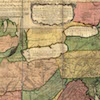 Critical examination of the definitions of "cultural heritage," its development as a concept, and the various laws, charters, and conventions that shape our management of the past in the present. The focus is on heritage in comparative colonial contexts.
Critical examination of the definitions of "cultural heritage," its development as a concept, and the various laws, charters, and conventions that shape our management of the past in the present. The focus is on heritage in comparative colonial contexts.“Professor Daehnke teaches this class every year and I highly recommend it. It is technically an archeology class, but it really didn’t feel like one. Professor Daehnke teaches about the relationship between colonial institutions of government and indigenous communities through historical and contemporary cases. We had many guest speakers come to talk to the class about things like the Relearning Garden and repatriation of cultural heritage. This class shifted the way I saw and understood the world and Professor Daehnke is a great teacher. Lectures introduced new concepts and case studies while films and guest lectures grounded those concepts and made them easy to understand.”
–M., 3rd Year Anth Student, Fall ‘17
ANTH 189: Archaeological Field Methods
 Lecture, laboratory, and fieldwork sessions on archaeological field methods including survey, mapping, excavation, record and database maintenance, artifact accessioning, curation, and analysis on the UCSC campus. Students attend lectures/laboratories two evenings each week and do fieldwork all day on Saturdays. Enrollment by instructor consent. Prerequisite(s): course 3 and application letter. Students who have done no previous fieldwork in archaeology have priority. Students are billed a materials fee. Enrollment limited to 15. (General Education Code(s): PR-E.)
Lecture, laboratory, and fieldwork sessions on archaeological field methods including survey, mapping, excavation, record and database maintenance, artifact accessioning, curation, and analysis on the UCSC campus. Students attend lectures/laboratories two evenings each week and do fieldwork all day on Saturdays. Enrollment by instructor consent. Prerequisite(s): course 3 and application letter. Students who have done no previous fieldwork in archaeology have priority. Students are billed a materials fee. Enrollment limited to 15. (General Education Code(s): PR-E.) “I took Anth 189 during Spring quarter of my freshman and sophomore year. Archaeology Field Methods is a great course to take if you want to pursue archaeology in the field. It allows you to take a closer look at what real archaeological field work is like by working with a real cultural resource management firm. In the class you cover survey methods, excavation methods, how to document your process and findings, some archaeological theory, and a history of the site you are excavating. I highly recommend this class if you are willing to give up all your Saturdays for a quarter. A chance to get hands-on archaeological experience for school tuition and while getting class credit is an amazing opportunity that cannot be passed up.” –D., 4th Year ANTH Student, Fall ‘18
ANTH 194S: Hearing Culture: The Anthropology of Sound
 Explores relationships between culture and acoustic worlds--environmental, verbal, and musical--within which we live. How sound is shaped by human belief and practice and the role sound plays in cultural and social life, both past and present. GE Code: CC, IS
Explores relationships between culture and acoustic worlds--environmental, verbal, and musical--within which we live. How sound is shaped by human belief and practice and the role sound plays in cultural and social life, both past and present. GE Code: CC, IS“I had the wonderful opportunity of taking my senior seminar with Dr. Don Brenneis. The class size was 17 students and we met three hours once every week. It allowed exploration between cultures and the acoustic worlds that are parts of our everyday lives. You begin to see, feel, and think of sound in different ways. How sound ties you to a feeling or memory. Where do you constantly hear sound or suddenly notice the absence of sound? It makes you wonder how life would be if it was not for sound in both auditory and physical ways. This amazing class enriches your perspectives and analytical skills of how cultures are strung together by sounds. Throughout the duration of this class, you develop a research paper in the pursuit of your interest and incorporate readings from the quarter. I did my research project on the sounds of mountain biking on the upper campus trails of our school and beyond by focusing on multipurpose trails in mountain and forest areas. Dr. Brenneis is a phenomenal professor, so if you have the chance to take a senior seminar with him, go for it! If not, you can also take other upper division courses he teaches such as: ANTH 110H: Acoustic Culture, ANTH 139 Language & Culture, ANTH 142: Anthropology of Law, ANTH 143 Performance and Power, etc.”
-E., 4th Year ANTH Student, Spring ’18
ANTH 194X: Women in Politics: A Third World Perspective
 Focuses cross-culturally on the status of women in the Third World and their formal and informal participation in politics. Also discussed are organized efforts, through participation in both national and autonomous movements, for women's rights. GE Code: W
Focuses cross-culturally on the status of women in the Third World and their formal and informal participation in politics. Also discussed are organized efforts, through participation in both national and autonomous movements, for women's rights. GE Code: W"I had the opportunity to take this class with Annapurna Pandey. We met once a week to discuss the implications of women who hold different political positions around the world. We were assigned readings that facilitated said discussions, allowing us an in-depth look at women who have managed to put themselves into political power in developing countries where women are not looked at as equal to men and are much less assumed to be capable to lead and organize a country. In addition to the readings, we were expected to keep up with current news, taking time to discuss the current political climate and acts of activism and resistance happening in our own country. Through these discussions, we were able to choose different social justice movements with women at their forefront or with a strong feminine involvement to analyze and discuss in a culminating final essay of about 20 pages." -Naima, 4th Year Anthropology Student, Spring '17
During my third year spring quarter, I decided to petition to take my senior seminar for my Anthropology major rather than wait for my fourth year. The seminar I choose to take was taught my Annapurna Pandey titled, “Anth 194X: Women in Politics: A Third World Perspective”. The reason I choose this class was because of my interest in the global perspectives, a topic we were able to discuss in the context of Third World women participation. In this seminar, we met once a week and each student- in a class of less than twenty students- would lead the class into a discussion based on assigned readings. This teaching method is extremely useful as not only does it allow the student in charge of the class discussion to become fully engaged with the class subject, but also allows other students to understand the material from a fellow student’s vocabulary. Pandey provided students with one-on-one help with her students during the writing process of their papers, having us meet with her once a week to discuss with her any issues we faced. At the end, we were able to present our papers to the class, allowing students to witness the work we accomplished in our research. If global politics, women’s rights, and third world perspectives is something you are even a little interested in, take this class and expand your knowledge- you won't regret it! - C., 4th Year Anthropology Student, Fall '18
ANTH 196G: Queer Worlds - Sexuality, Intimacy, and Power in Contemporary Ethnography
How do we read, write, and recognize the queer body? How is it marked in politics, in intimate spaces, and in the ethnographic text? Drawing on ethnic studies and black queer studies, this seminar engages contemporary anthropological approaches to sexuality. . (Also offered as Critical Race & Ethnic Studies 190G. Students cannot receive credit for both courses.) Prerequisite(s): Satisfaction of the Entry Level Writing and Composition requirements; and ANTH 1, ANTH 2, and ANTH 3. Enrollment is restricted to senior anthropology majors. Enrollment limited to 25
“ANTH 196G is a fantastic course for anyone interested in cultural anthropology, specifically queer studies or alternative lifeworlds; you’ll get to delve into topics of survival and mutual aid, ethnographic studies of different queer communities, and theorizing what constitutes queerness/who gets to decide/the politics around gatekeeping. Professor Shange does an excellent job at not only making each class thought-provoking and engaging but also making otherwise dense theoretical concepts understandable. She opens each class meeting with a check in and icebreaker to help get everyone acquainted and familiar with each other, which I especially appreciate during this time when we are all so isolated. In addition to assigned readings, she has students engage with media (such as short films, YouTube clips, zines, etc.) both during and outside of class to help reinforce concepts and deepen our understandings. With writing assignments, she has us draw from our own life experiences and think critically about them in tandem with the course material, in order to make our work feel less like an academic study and more like tangible/personal experiences. For example, for my final writing project, I was able to write an ethnographic study on my weekly experience going to ‘Club Quarantine’, a virtual queer online dance party that took place over Zoom every night since the start of the pandemic. It was the most fun I’ve had working on any research in my undergraduate career, and I felt like I got the support and resources I needed throughout the quarter to finish with a strong ethnography that tied in many of the course themes. Overall, this seminar is a great fit for those who thrive in a collaborative and social setting, where there are equal parts lecture and discussion.” -K., 4th-year ANT Student, Fall ‘20.
ANTH 196R: Design Anthropology
Senior seminar introduces students to principles, approaches, methods, and professional dimensions of design anthropology. Emphasizes collaborative methods and development of new methods for ethnographic research, analysis, and communication. Through a quarter-long research project, students develop professional skills and portfolio materials. Prerequisite(s): satisfaction of the Entry Level Writing and Composition requirements. Enrollment restricted to senior anthropology majors and is by permission. Students cannot receive credit for this course and course 208C. Enrollment limited to 16.
"This course in Design Anthropology offers students a chance to see what applied anthropology looks like in the real world. Not only does this course allow students to play with and redefine anthropological theories in their own way, but it also also exposes students to the professional world that students are not usually exposed to until they are actively seeking employment. As a hands-on class, it also allows abstract ideas to become much more tangible and applicable to students’ studies and interests. This course is for students who are seeking to understand how their knowledge and practices of anthropology, whether it is from a cultural, biological, or archaeological perspective, can be used to influence the world around them for the better." -B., 4th Year Anthropology Student, Winter '20
ANTH 196W: Anthropology of Weather and Exposure
Students discuss how differing approaches to weather and exposure generate different approaches to culture, science, and politics; identify key moments in cultural anthropology's engagement with environmental and climactic questions; and delineate new areas of research. Prerequisite(s): ANTH 1, ANTH 2, and ANTH 3. Satisfaction of the Entry Level Writing and Composition requirements. Enrollment is restricted to senior Anthropology majors. Enrollment limited to 20.
"Anth 196W focuses on how weather and exposure affect humans, looking at moments where we can use cultural anthropology to unpack a weather event or occurrence. I didn't really know what to expect taking this class, especially as someone who is more interested in biological anthropology, but I was pleasantly surprised. Jerry Zee brings so much enthusiasm to the class every week and really encourages a creative thinking and positive learning atmosphere that I have rarely gotten in my college experience. Expect to learn such a broad range of concepts from sensory experiences, to biological warfare, to climate change. The class is structured like a large discussion so it is necessary to do your reading before class or you risk looking unprepared. However, the reading is very relevant and engaging so it doesn't feel like a chore. You will also do two group presentations throughout the quarter that you sign up for on the first day so make sure you browse the syllabus before class so that you have a feel for what you are interested in. " -A., 4th Year Anthropology Student, Fall '19
